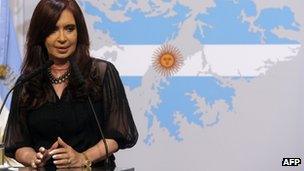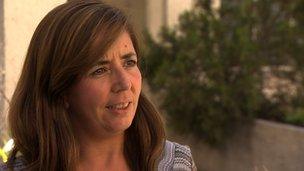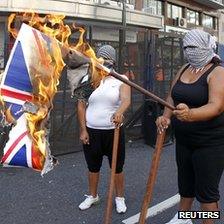Falkland Islands: How strong is Argentina's position?
- Published

President Cristina Fernandez de Kirchner believes the islands belong to Argentina
Thirty years after Argentina invaded the Falkland Islands, everyone here seems agreed on one thing: it will not happen again.
Military spending has been cut back savagely. Argentina's air force is still only equipped with the planes it had in 1982.
There is basically only enough money in the defence budget nowadays to pay the wages of the soldiers, sailors, airmen and civilians the armed forces ministry employs, and to finance their greatly-restricted local operations.
"Argentina has unilaterally disarmed itself since the 1990s," said Carlos Escude, a foreign affairs adviser to the previous government.
"Our munitions would only last for a 25-hour shooting war against Paraguay. After that, Paraguay would invade us."
But President Cristina Fernandez de Kirchner is using different weapons against Britain's ownership of the Falkland Islands: diplomatic ones.
Her supporters here believe that her approach is paying off handsomely.
"This is the first time that all of Latin America is with Argentina in this claim [to the islands], even Brazil, even Chile," said Gabriela Cerruti, a Buenos Aires politician allied to President Fernandez's government.

Gabriela Cerruti said Argentina's claim to the islands is supported by other Latin American nations
"That makes a change in the situation, and makes the Argentine position much stronger."
And she believes it could go wider than that: "We're supporting Spain in its claim to Gibraltar, and we hope Spain will support us."
It is true that Brazil, Uruguay, Chile and other Latin American countries have openly supported Argentina's claim to the islands.
There is an instinctive disapproval in the continent of the remnants of colonialism, and a feeling that a European power has no real business operating from territory in the South Atlantic.
Argentina interprets this support as a growing sign that Britain is feeling the heat. The British government disagrees.
Foreign Secretary William Hague told me in London: "People in Argentina would be very much mistaken if they thought Britain was retreating from the scene, or is not interested in the region, or is weakening in any way in our commitment to the people of the Falkland Islands."
No 'ordinary' president
Argentina's hope is that Britain will become so embarrassed by the disapproval of other countries that it will eventually agree to negotiate with Argentina over the sovereignty of the islands.
If Cristina Fernandez was an ordinary president, that might be a possibility. But she is not.
Under her rule, Argentina is starting to worry many of the countries whose support she most needs.

Her government seems to be slipping away from its traditional pro-Western position, and growing closer to Venezuela, Bolivia, Cuba and even Iran.
Countries in the region as different as Brazil, Chile, Colombia and Peru find this increasingly worrying.
Brazil has also been annoyed by President Fernandez's proposals for a non-nuclear South Atlantic, as part of its campaign against the British presence in the Falklands.
The problem is, Brazil is building seven nuclear-powered submarines of its own.
There are plenty of other irritants.
Last year, when Argentina's trade surplus dropped by 11%, the government introduced a complicated system of import restrictions.
On Friday, 40 countries - including the US, the European Union nations and Japan - attacked Argentina angrily at the World Trade Organisation.
Like Bolivia and Venezuela, Argentina has now cut its links with US policy on drug control, forcing the American Drug Enforcement Administration to leave the country.
'Domestic problems'
Supporters of President Fernandez's policy, like Mr Escude, defend these things by saying that former great powers like the US and Britain no longer matter as much as they once did, and that countries like Brazil are taking over.
Yet Brazil is anxious to keep its good relationships with the US and Britain, and does not want to have to side with Argentina against them - over the Falkland Islands or anything else.

Argentina contests the UK's claim over the islands with tensions escalating during the past year
Leading Argentine constitutional lawyer Daniel Sabsay is one of several thousand signatories to an open letter which calls for Argentina to consider the rights and opinions of the Falkland Islanders.
He believes the government's sudden interest in the Falklands is a deliberate distraction from Argentina's increasing problems at home.
"This conflict is a mask, something that is useful to hide other problems we have."
Argentina's problems are certainly worsening. After 10 years of growth, the official inflation rate is 7%, but private economists currently put it at 22%.
Wage demands are mounting, and low and middle-income families are starting to struggle.
Five years ago, in 2007, when President Fernandez's late husband Nestor Kirchner was president, Argentina broke off discussions with Britain about the development of the Falkland Islands' resources, on grounds no progress was being made on the question of sovereignty.
Isolated nation
But there was little sign of any other interest in the islands. It was only in June last year, in an interview with the editor of the English-language Buenos Aires Herald, that the defence minister, Arturo Puricelli, launched the government's attack on the issue.
The Herald, edited by Carolina Barros, is a small newspaper with a famous history.
During the so-called Dirty War, carried out by the country's military in the 1970s and early 1980s, it was the only newspaper which had the courage to raise the issue of the people who were disappearing - 20,000 or more of them.
Ms Barros maintains that the Fernandez government is nowadays trying to control the media - only parts of which are anyway independent of government influence.
Not long ago, she says, every newspaper received a letter from the official statistics agency, which the opposition maintains is heavily influenced by the government, warning that they should not quote figures from independent economists - for instance the inflation estimate of 22%.
"We are becoming like Venezuela, where you aren't allowed to print the genuine exchange rate for the dollar," Ms Barros said.
President Fernandez runs a strange kind of government. She never gives interviews or press conferences; instead, she regularly broadcasts her views direct to the country on television.
Her critics believe she is becoming more and more isolated. The similarities with Hugo Chavez of Venezuela, they say, are growing.
"The trouble is, she is isolating Argentina too," says Ms Barros.
"We will soon be almost on our own in the world."
Mr Sabsay agrees: "It is very difficult to trust a country which is so mercurial, changing every day."